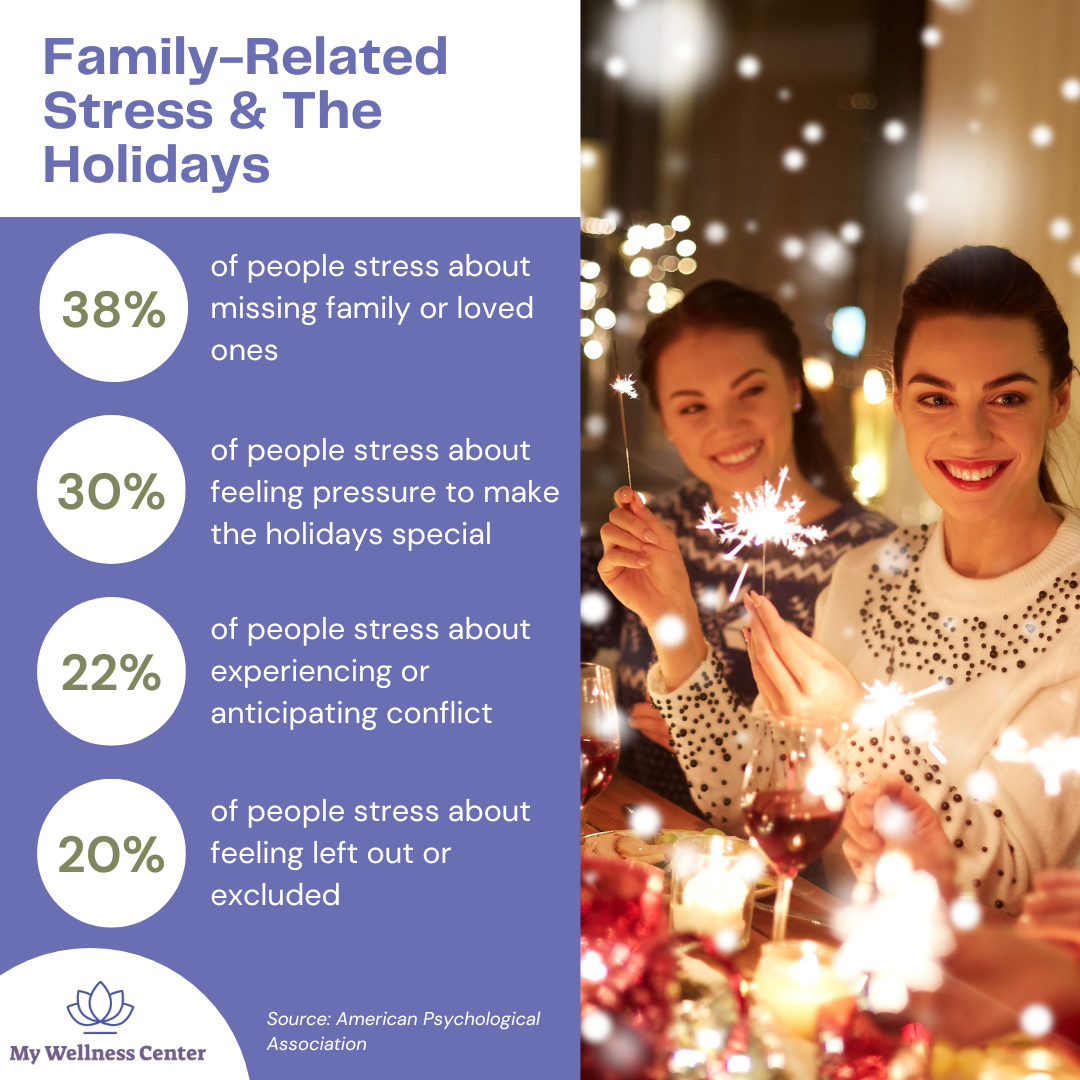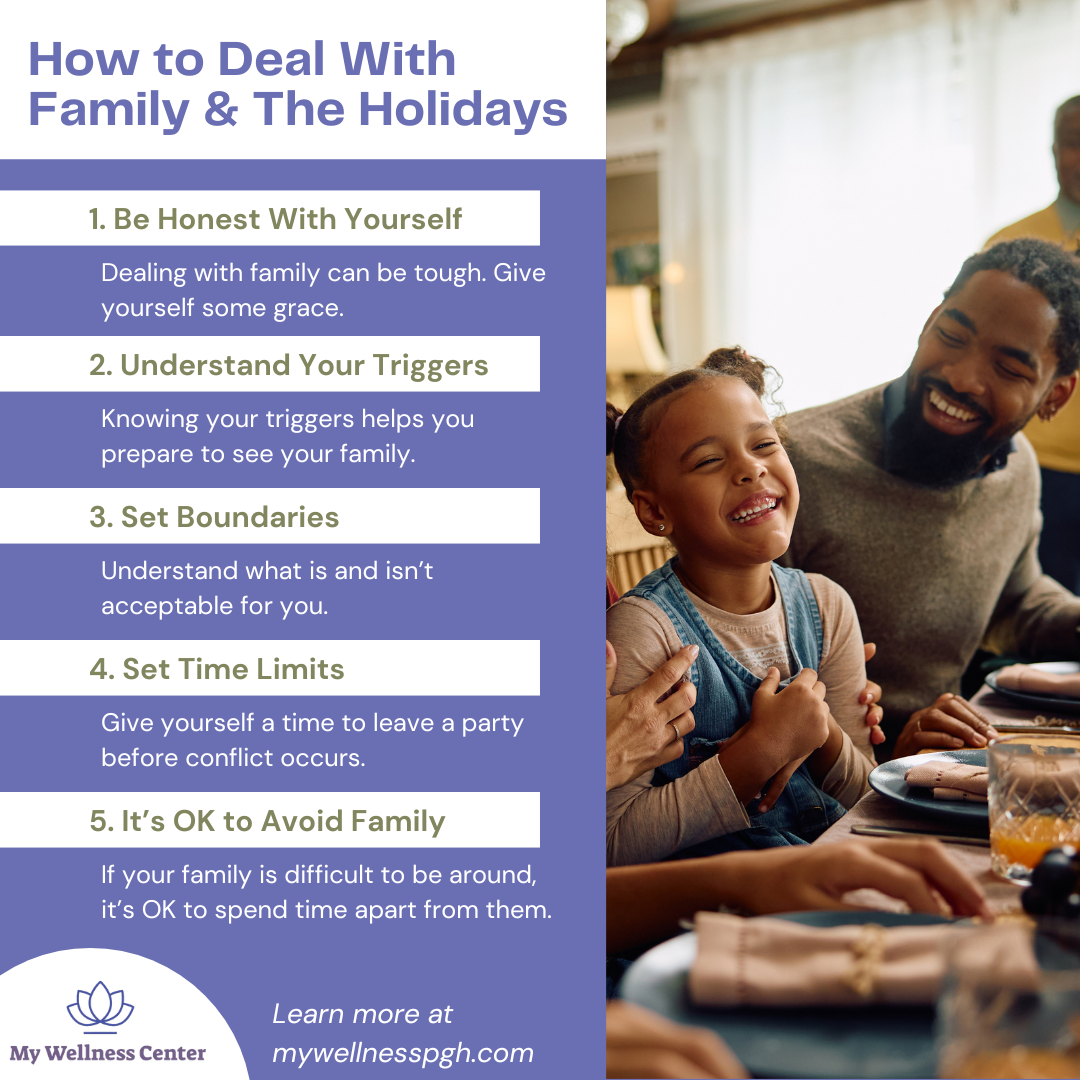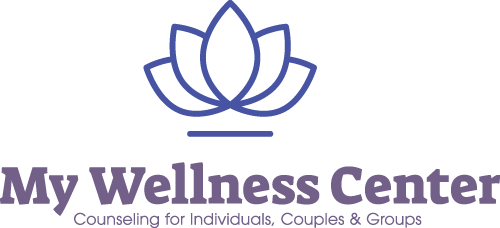Every year around the holidays, we see an influx of referrals and inquiries from people who struggle to deal with their families.
Whether it’s Thanksgiving, Christmas, or another reason for gathering, the holidays bring people together—and not always for the better.
For some families, the holidays are one of the few times members see each other throughout the year, and these gatherings have the potential to dig up old wounds, disagreements, and tensions.
To help, we’re exploring some of the reasons these holiday conflicts happen—and how you can deal with your family around the holidays (similar to help you might need help dealing with a toxic workplace).
How Do Families Create Stress Around the Holidays?
Family relationships can create emotional turmoil during the holiday season—and it’s more common than you may realize. Researchers from the American Psychological Association have found that during the holidays:
- 38% of people stress about missing family or loved ones
- 30% of people stress about feeling pressure to make the holidays special
- 22% of people stress about experiencing or anticipating family conflict
- 20% of people stress about feeling left out or excluded

With so much stress, many people try to avoid their families all together. According to a recent survey from USA Today:
- Nearly 85% of Americans avoid family over the holidays, either by lying about their schedule or scheduling a trip during planned holiday parties.
- If there is going to be an argument, it’s most likely to be about family issues (51%), politics (48%), or money (47%). (Read our article on Social Justice And Mental Health to learn more about health and politics.)
- If you’re going to argue with someone, it’s most likely to be with your father (38%), grandma (36%), or grandpa (32%).
With all of that research in mind, let’s look at why families can be so difficult at the end of the year.
‘Why Is My Family So Hard to Deal With Around the Holidays?’
There are many common reasons why family members can be difficult to manage during the holiday season.
Some of the biggest reasons include:
1. People Drink Too Much
Many people seize the holidays as an opportunity to unwind with alcohol, and this can lead to numerous issues. Here’s why:
- Alcohol Reduces Inhibitions – Alcohol slows down the central nervous system and depresses the cerebral cortex, which leads to relaxation, overconfidence, and weakened judgment. As a result, some people may be more willing to start or engage in arguments they would otherwise avoid.
- Alcohol Can Help You Relax, But It Can Go Too Far – You might turn to alcohol to help you cope with the stressors your family creates, but drinking too much can quickly backfire. As your own inhibitions are lowered, you might accidentally say or do things you regret, which creates even more tension.
- Some People Are Simply “Mean Drunks” – Of course, some people are simply “mean drunks”—because of lowered inhibitions, personality traits, impulsiveness, or because of alcohol myopia (difficulty in interpreting social cues).
2. People Fall Into Old, Toxic Patterns
Whether they realize it or not, many families have patterns. For example:
- A family might have an undesirable nickname for someone who doesn’t like it.
- A family might frequently refer to an embarrassing moment in someone’s past.
- A family might tease someone for failing to get a job, finish school, or reach another milestone.
These patterns can become triggers for individuals, and identifying these triggers beforehand can be instrumental in keeping a cool head and responding in a healthy manner.
3. Families Have Secrets That Can Come Out Around the Holidays
Families and family members often have secrets about events in the past.
Occasionally, the alcohol and emotions of the holidays can bring these secrets to the surface, resulting in embarrassment, emotional pain, or even legal trouble.
Related Reading: What Is Gray Divorce? How to Survive Divorce After 50
4. Things That Were “OK” Years Ago Aren’t OK Now
Those old patterns, behaviors, and habits your family became so used to so many years ago may no longer be appropriate—even if they still think it’s OK.
As your family remained stuck in the past, you might have:
- become better educated
- built more self-esteem
- came to better understand the world around you
Whatever the reason, your growth has empowered you to identify the faults in your family’s behavior—and that’s OK!
How to Deal With Your Family Around the Holidays
Here are a few ways to better manage your family and emotions during the busy holiday season:

1. Be Honest And Gentle With Yourself
Dealing with family can be tough. Even if you love your family, they can still get on your nerves or tap into deep-seated emotions or memories that can be difficult to manage.
Be honest with yourself about how you feel about your family and the prospect of seeing them again. Accept your feelings as valid—and don’t criticize yourself for dreading another family dinner or holiday party.
Give yourself some grace.
2. Understand Your Triggers
Before gathering with your family members, identify your biggest triggers.
Maybe you can’t stand your father’s attitude after he’s been drinking. Maybe you hate the way your cousin talks to your family members. Or maybe you bicker with your sister whenever you’re in the same room.
Knowing your triggers beforehand can help you prepare for them ahead of time—and figure out an appropriate response.
3. Set Boundaries For Yourself And Others
Once you know what your triggers are, establish boundaries.
A few examples:
- If you’re worried about your father’s attitude when he’s been drinking, talk to him beforehand. Explain that if he’s rude during the party, you’ll leave.
- If you’re worried about the way your cousin talks to your family members, talk to them beforehand. Explain that if they’re rude, crude, or mean, you’ll leave (or commit to some other response).
- If you’re worried about fighting with your sister, talk to her beforehand and explain that you’re uninterested in arguing during the holidays.
Related Reading: Teen Therapy: What You Should Know
More than anything, know how to prevent yourself from reacting negatively during the holidays. For example, you could:
- Limit the number of drinks you have.
- Limit the amount of time you spend at family functions.
- Sit near individuals you get along with.
- Drive by yourself so you can leave at any time.
When it comes to boundaries, here’s the most important thing: Know how you’re going to respond before you enter a family function. This helps you ensure you’ll respond in a healthy, appropriate manner.
4. Set Time Limits For Yourself
A surefire way to avoid too many conflicts or stress is to set a time limit for yourself while attending a family function.
Before reaching the holiday party, know exactly how long you’re going to stay. If needed, let the host know beforehand that you’ll have a limited amount of time to attend.
Limiting yourself to 30 minutes, an hour, or two hours allows you to dip before too many arguments break out or too much alcohol is consumed.
Another great idea: Arrive just as the party is starting. This allows you to make an appearance before the party is in full swing, which might help you avoid the more common stressors that break out once everyone is relaxed (especially if there is going to be alcohol).
5. Know That It’s OK Not to Be With Family
If your family is truly difficult to be around, understand that it’s OK to not spend time with them.
If you’d like to see them outside of holiday parties, offer to see them at smaller functions or in one-on-one settings (like grabbing coffee or going holiday shopping together) where you’re confident you’ll experience fewer triggers.
We also recommend considering avoiding your family traditions, if there has been a major lose in the family. For example, if your family has always celebrated at your grandmother’s house and she passed away in October, it may be best to hold the party elsewhere—even if you all still have access to her home.
Traditions and places can drum up old emotional wounds and make it difficult to get through the holidays.
Find A Pittsburgh Therapist To Help You Through the Holidays
If you need a little extra support during the holiday season, contact us. Our compassionate Pittsburgh therapists are standing by to help you through those big moments at the end of the year.
To learn more about us, check out our counseling and therapy services or find additional guidance by reading the rest of our blog.

